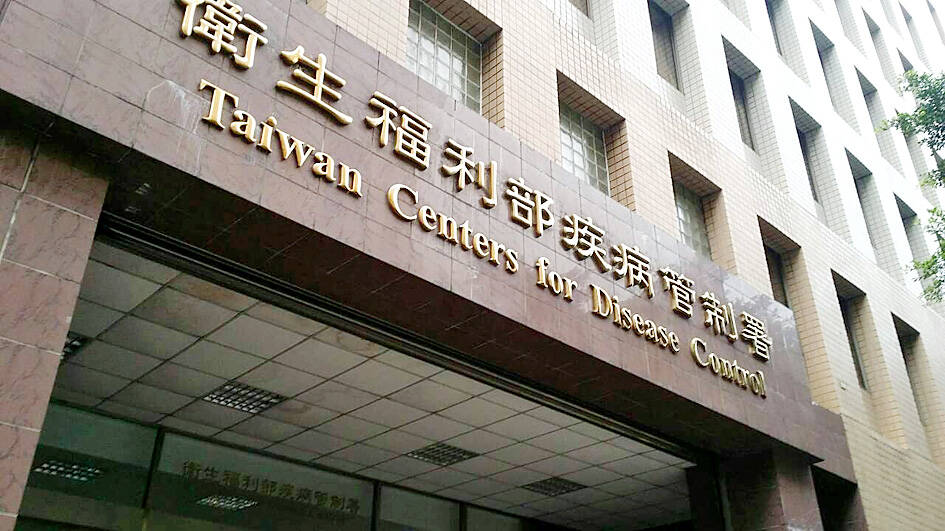Members of the National Vaccine Injury Compensation Program (VICP) committee at their latest meeting agreed to provide compensation of NT$3.5 million (US$114,829) to the family of a child who died of fulminant myocarditis after receiving her second dose of the Pfizer-BioNTech COVID-19 vaccine.
Ten of the 118 cases reviewed during the meeting were awarded compensation, including one case of adverse reaction after receiving a Bacillus Calmette-Guerin (BCG) vaccine and nine cases of adverse reactions after a COVID-19 vaccine.
One of the cases is a Taoyuan girl aged five to 11, who died of fulminant myocarditis after receiving her second shot of the Pfizer-BioNTech vaccine.

Photo: Lin Hui-chin, Taipei Times
Centers for Disease Control (CDC) Deputy Director-General Philip Lo (羅一鈞), the Central Epidemic Command Center’s (CECC) spokesperson, said the girl lost consciousness three days after receiving the shot, and a cardiac ultrasound scan showed preserved systolic function, suggesting fulminant myocarditis.
A forensic autopsy found lymphocytic infiltration within her myocardial fibers, of which viral infection is the most common cause, as the Pfizer-BioNTech vaccine is an mRNA vaccine that is non-pathogenic, he said.
However, Lo said that considering the sequence of events, the committee cannot rule out fulminant myocarditis being associated with the vaccine, as the risk of myocarditis after a second shot is higher than the first shot of the Pfizer-BioNTech vaccine.
The committee agreed to offer the girl’s family NT$3.5 million in compensation and NT$300,000 for the funeral, which is the highest compensation amount for an adverse reaction after receiving a COVID-19 vaccine.
According to post-vaccination adverse reaction report data, the incidence rate of myocarditis and pericarditis after Pfizer-BioNTech COVID-19 vaccination in the five-to-11 age group is 4.5 per million for boys and 4.8 for girls, which is similar to the rates in other countries.
Separately, the CECC yesterday reported 12,792 new local COVID-19 cases, 298 imported cases and 46 deaths.
The local caseload fell 18.7 percent from Sunday last week.
Lo said 98,613 new cases were reported from Feb. 19 to Saturday, down 13.9 percent from a week earlier.
Deputy Minister of Health and Welfare Victor Wang (王必勝), who heads the CECC, has said the center is revising the guidelines for reporting cases and discussing when to remove the mandatory isolation rule for confirmed cases.
Asked about the issue, Lo said changes could be announced next month at the earliest.
An easing would depend on the daily caseloads after the 228 Memorial Day long weekend and the end of most mask requirements on Monday next week, he said.

A Taiwanese software developer has created a generative artificial intelligence (AI) model to help people use AI without exposing sensitive data, project head Huang Chung-hsiao (黃崇校) said yesterday. Huang, a 55-year-old coder leading a US-based team, said that concerns over data privacy and security in popular generative AIs such as ChatGPT and DeepSeek motivated him to develop a personal AI assistant named “Mei.” One of the biggest security flaws with cloud-based algorithms is that users are required to hand over personal information to access the service, giving developers the opportunity to mine user data, he said. For this reason, many government agencies and

The National Fire Agency on Thursday said a series of drills simulating a magnitude 8.5 earthquake would be held in September to enhance the government’s emergency response capabilities. Since earthquakes cannot be predicted, only by continuously promoting disaster prevention measures could Taiwan enhance its resilience to earthquakes, agency Director-General Hsiao Huan-chang (蕭煥章) said in a news release. The exercises would be held to mark annual National Disaster Prevention Day on Sept. 21, the aim of which is to test Taiwan’s preparedness and improve its earthquake resilience in case of a major temblor, Hsiao said. As part of those drills, an earthquake alert would

DEFENSE: The National Security Bureau promised to expand communication and intelligence cooperation with global partners and enhance its strategic analytical skills China has not only increased military exercises and “gray zone” tactics against Taiwan this year, but also continues to recruit military personnel for espionage, the National Security Bureau (NSB) said yesterday in a report to the Legislative Yuan. The bureau submitted the report ahead of NSB Director-General Tsai Ming-yen’s (蔡明彥) appearance before the Foreign and National Defense Committee today. Last year, the Chinese People’s Liberation Army (PLA) conducted “Joint Sword-2024A and B” military exercises targeting Taiwan and carried out 40 combat readiness patrols, the bureau said. In addition, Chinese military aircraft entered Taiwan’s airspace 3,070 times last year, up about

STRICTER ENFORCEMENT: Taipei authorities warned against drunk cycling after a sharp rise in riding under the influence, urging greater public awareness of its illegality Taipei authorities have issued a public warning urging people not to ride bicycles after consuming alcohol, following a sharp rise in riding under the influence (DUI) cases involving bicycles. Five hundred and seven people were charged with DUI last year while riding YouBikes, personal bicycles, or other self-propelled two-wheelers — a fourfold increase from the previous year, data released by the Taipei Police Department’s Traffic Division showed. Of these, 33 cases were considered severe enough to be prosecuted under “offenses against public safety,” the data showed. Under the Road Traffic Management and Penalty Act (道路交通管理處罰條例), bicycles — including YouBikes and other